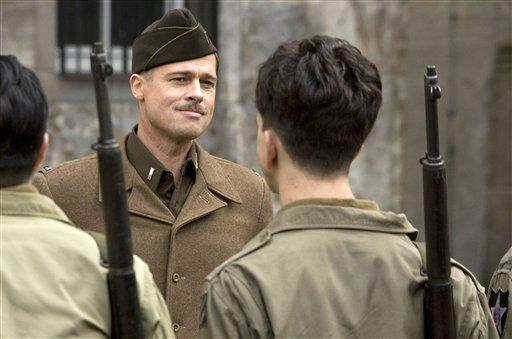The summer season has ended with “Inglourious Basterds,” a provocative film by Quentin Tarantino. Hailed by critics and audiences alike as a return to form for the acclaimed director of “Pulp Fiction,” “Basterds” is a Nazi-themed, spaghetti western-inspired revenge flick situated in France.”Basterds” is divided into chapters and begins with an S.S. official, known as the Jew hunter, grilling a French farmer about several runaway Jews in the vicinity. Their conversation ingeniously switches from French to English and ends with a burst of gunfire. Several Jews get killed, and only a girl, Shosanna, escapes.The film jumps to a bunch of ragtag American soldiers recruited to disrupt German morale by assassinating Nazi officials. The group of eight soldiers, known as the Basterds, scalp their victims, then carve a swastika into the head of survivors who are commanded to spread the word.The film focuses on revenge plot involving the Basterds and Shosanna, both independently planning the death of the Fuhrer. The film ends with a conflagration in a cinema, much like the Reichstag fire.The camera movement as the farmer and Jew hunter speak creates sweat-induced, hair-standing tension. The switch to English provided the needed levity to the mesmerizing scene. Basterds is a beautifully shot film. From the establishing shot of the cottage, which lingers long enough to give a sense of the milieu, to a shot of Shosanna appetizingly attired in red, staring through a window as the camera zooms in, the film oozes life and vibrant colors.It is such a pity then that such a gorgeous film ignores the moral implications of its existence. By masquerading his Jewish revenge flick as a flight of fantasy, Tarantino denies us the pleasure he supposedly hopes to provide and ignores contemporary parallels to his tale. The film makes the Holocaust much harder for current audiences to relate to and thereby shows the limits to which the current film medium is capable of showing evil.In the latest edition of the Atlantic, Tarantino indicted Hollywood for making films in which Jews were always victims. He wanted to make something different.”Let’s see Germans that are scared of Jews,” Tarantino said. “Let’s not have everything build up to a big misery, let’s actually take the fun of action-movie cinema and apply it to this situation.”Unfortunately, “Basterds” only delivers foreplay: Engaging dialogue, yes; scalping, shooting, bludgeoning and arson, yes. Then what? The excitement doesn’t linger because the characters in the films are scantily drawn types, not human beings — in the absence of empathy, the vicarious pleasures don’t exist. For example, Shosanna’s vengeance rests on her relationship with a black man that is devoid of any spark, a romantic attachment that is hokum. Besides, the only thing we see the Basterds do is kill, which has nothing to do with them being soldiers or Jews; they are just murderers.During my first screening, the audience cheered during the climax as Hitler was riddled with bullets from a Basterd’s machine gun. Ironically, this was in the same week our State Department officials were berating Libya for giving the released Lockerbie bomber, Abdel Basset Ali al-Megrahi, a victory celebration. While we were enjoying our fantasy, we begrudged others their reality. Otis Ferguson once asked, “When we were laughing, what were we thinking?” Consider: If the Taliban made a film in which the president was shot, would we be as quick to defend it as a Mullah’s fancy?Hence, the film’s indifference to what made a Nazi evil is its failing. Tarantino relies on the audience’s identification of the Germans as bad guys (and the Americans as good) to justify the bloodletting. It is possible the filmmaker believes wearing a Nazi uniform automatically made a person a target for Jewish executioners. Yet were the German civilians or foreign collaborators less culpable than those in uniform? While watching “Basterds,” it became impossible to identify the WWII portrayed as the same conflict that martyred Dietrich Bonhoeffer, devoured Anne Frank, scarred Primo Levi and left Hannah Arendt scouring to make sense of 20th century totalitarianism.”Basterds” leaves me wondering if evil can be transcribed on the screen. Recent attempts have not been encouraging. “Valkyrie” quit after the first reel, instead ramping up the suspense elements. Have we become so accustomed to horror that we don’t realize the Holocaust is not just an event that occurred 70 years ago but one that could happen tomorrow in Darfur or Chechnya? Or are we like Emmanuelle Riva in “Hiroshima, Mon Amour,” doomed to forget what we fail to understand?With his latest film, Tarantino showcases his immense cinematic vocabulary and intelligence; however, in “Inglourious Basterds” we have, as Àngel Quintana said, a landscape where “Cruelty has no limits, the victims’ suffering does not count, everything is part of a bright visual idea which aims to revalue the importance of entertainment.”Freke Ette is political theory graduate student from Uyo, Nigeria. Follow him on Twitter@TDR_fette.—-Contact Freke Ette at fette@lsureveille.com
Freke Friday: Tarantino’s ‘Basterds’ a beautiful, immoral film
September 4, 2009

In this film publicity image released by The Weinstein Co., Brad Pitt is shown in a scene from, “Inglourious Basterds.”




